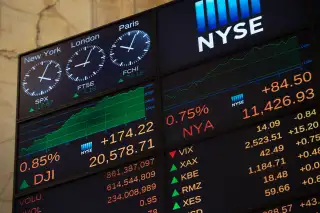Dividend Stocks No Longer Pay. Here's a Better Way to Invest

Stocks that routinely throw off income to their shareholders have been the market's darlings over the past decade, as nervous investors sought the comfort only regular cash payments can deliver. But as a result, dividend stocks—which have historically outpaced the market—are now expensive.
High-yielding utility shares, for instance, have grown 70% more expensive in just this past year based on their price/earnings ratios, a common gauge of stock valuations. This makes it less likely that dividend payers can continue to produce market-beating returns.
So maybe it's time to look at firms that don't throw off income but reinvest in themselves instead.
Corporations have amassed an astonishing amount of cash: Nearly $1.5 trillion sits on the books of U.S. companies (not counting banks). Apple alone has $247 billion.
In addition to issuing dividends, companies can use cash to buy back their stock (reducing shares outstanding will boost a firm's earnings per share). But "if a company can't think of anything to do with its cash but buy back stock, we hope that's not the decision tree they're following," says Oakmark Fund co-manager Win Murray.
Reinvesting money in the business to promote future growth, however, can have a profound impact. "Smart capital spending can have a multidecade payback period," Murray says. The key word here is "smart." Plenty of companies waste money on unnecessary buildings, such as lavish new offices, that don't pay off.
One place to look for companies that don't make such mistakes is the S&P Capex Efficiency index, which has gained 17.3% over the past 12 months, vs. 10% for the S&P Dividend Aristocrats index.
The Capex, which beat the S&P by more than a percentage point a year over the past decade, focuses on firms where capital expenditures have boo sted sales. Among its top names: Regeneron Pharmaceuticals (REGN) and Alphabet (GOOGL).
To be sure, businesses sometimes buy plants and equipment rather than build their own. So look for firms with an eye for bargains, says Wallace Weitz, manager of the value-minded Weitz Funds. "Making bad acquisitions can be a terrible use of capital," he says.
Among the top holdings in his Weitz Partners Value Fund (WPVLX) are Alphabet and Warren Buffett's Berkshire Hathaway (BRK.B), which, contrary to popular belief, issues no dividends to its shareholders.
As Buffett wrote in 2013, "Our first priority with available funds will always be to examine whether they can be intelligently deployed in our various businesses." While he admits he has made plenty of mistakes, Berkshire has posted twice the annual gains of the S&P 500 since 1965. And that's factoring in reinvested S&P dividends.